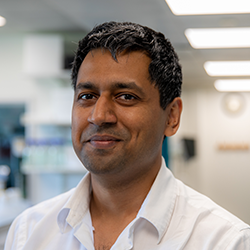-
Academic Urologist
-
Group Leader, Early Cancer Institute
Biography
Harveer graduated with a BA(Hons) in Natural Sciences (2008) and an MB BChir (2011) from the University of Cambridge, before completing his basic surgical training at Addenbrooke’s Hospital. He developed his research interest in the role of DNA repair in cancer as a Fulbright Scholar at the Dana- Farber Cancer Institute (Boston, USA), and as a Wellcome Trust Doctoral fellow at the Gurdon Institute (Cambridge, UK). He is currently a Clinical Lecturer in early cancer detection at the University of Cambridge, and Prostate Cancer Foundation Young Investigator (2021).
We are a surgical translational research group, driven by the critical need to improve the outcomes of patients with lethal prostate cancer. We use cellular and patient-derived models as well as surgical and clinical trial specimens, to study the behaviour of high risk prostate cancers, and their response to therapies. We are particularly interested in therapies which target the DNA damage response pathway, gene mutations in which are well associated with earlier onset and more aggressive disease, and predicting clinical response.
We work across leading-edge technologies, utilising multi-omic sequencing approaches on clinical trial specimens, functional genomic screening using CRISPR-Cas9 gene-editing, and leveraging primary organoids from early high risk cancer cohorts to gain our insights. We have ongoing collaborations with industry and pharmaceutical partners, as well as groups across the Alliance for Cancer Early Detection.
Publications list:
Key publications:
- Shieldin complex promotes DNA end-joining and counters homologous recombination in BRCA1-null cells. Dev, H., Chiang, T. W., Lescale, C., de Krijger, I., Martin, A. G., Pilger, D., Coates, J., Sczaniecka-Clift, M., Wei, W., Ostermaier, M., Herzog, M., Lam, J., Shea, A., Demir, M., Wu, Q., Yang, F., Fu, B., Lai, Z., Balmus, G., Belotserkovskaya, R., … Jackson, S. P. (2018). Nature cell biology. 20(8), 954–965. doi:10.1038/s41556-018-0140-1
- Synthetic lethality between androgen receptor signalling and the PARP pathway in prostate cancer. Asim, M., Tarish, F., Zecchini, H. I., Sanjiv, K., Gelali, E., Massie, C. E., Baridi, A., Warren, A. Y., Zhao, W., Ogris, C., McDuffus, L. A., Mascalchi, P., Shaw, G., Dev, H., Wadhwa, K., Wijnhoven, P., Forment, J. V., Lyons, S. R., Lynch, A. G., O'Neill, C., … Helleday, T. (2017). Nature communications, 8(1), 374. doi:10.1038/s41467-017-00393-y
- Investigating upper urinary tract urothelial carcinomas: a single-centre 10-year experience. Dev, H. S., Poo, S., Armitage, J., Wiseman, O., Shah, N., & Al-Hayek, S. (2017). World journal of urology, 35(1), 131–138. doi:10.1007/s00345-016-1820-8
- Surgical margin length and location affect recurrence rates after robotic prostatectomy. Dev, H. S., Wiklund, P., Patel, V., Parashar, D., Palmer, K., Nyberg, T., Skarecky, D., Neal, D. E., Ahlering, T., & Sooriakumaran, P. (2015). Urologic oncology, 33(3). doi:10.1016/j.urolonc.2014.11.005
- Biobanking after robotic-assisted radical prostatectomy: a quality assessment of providing prostate tissue for RNA studies. Dev, H., Rickman, D., Sooriakumaran, P., Srivastava, A., Grover, S., Leung, R., Kim, R., Kitabayashi, N., Esqueva, R., Park, K., Padilla, J., Rubin, M., & Tewari, A. (2011). Journal of translational medicine, 9, 121. doi: 10.1186/1479-5876-9-121.

